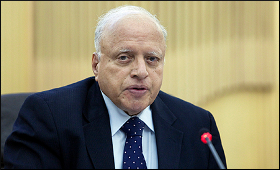|

|
Special Agri Zones can aid food security: M.S. Swaminathan
|
|

|
|
| Top Stories |
 |
|
|
|
Anando Bhakto | 28 Jul, 2014
He's been credited with mentoring the Green Revolution of the 1960s and 1970s that saw India grow from a food deficit nation to a food surplus nation. Now, in the face of an "unpredictable" monsoon, M.S. Swaminathan has called for Special Agricultural Zones (SAZs) as a means to ensure food security.
"A Special Agricultural Zone is one where agricultural land is preserved for posterity because of its importance to increasing agriculture production and promoting livelihood security for a large number of farm families," Swaminathan, who has been described by the United Nations Environment Programme as the "Father of Economic Ecology", told reportsr in an interview.
He hoped that the case for SAZs would be taken up as a policy matter by the Narendra Modi government, citing the successful examples of Rajasthan and Kerala.
"The examples I have been giving are the Indira Gandhi Canal Area (Rajasthan Canal) in Rajasthan, and the Kuttanad wetlands of Kerala which has been declared by FAO (Food and Agricultural Organisation) as a globally important agricultural heritage site," said the octogenarian founder-chairman of the M.S. Swaminathan Research Foundation, a Chennai-based non-profit research organisation active in pro-sustainable on-farm and non-farm livelihoods through eco-technology and knowledge empowerment.
"Although the government has adequate reserves to provide five kilograms of wheat, rice or millet per month to nearly three-fourths of our population, a legal obligation under the National Food Security Act, one major drought can exhaust the food stocks," Swaminathan maintained.
The monsoon rainfall was 43 percent below average in June and the deficiency had come down to 36 percent by July 16.
As on June 1, 2014, the foodgrain stock, which includes rice, wheat, unmilled paddy and coarse grains, stood at 74.8 million tonnes. Foodgrain production in 2013 was pegged at 263.2 million tonnes.
Swaminathan opined that 67 years after India's independence, a lot remains to be done to face the challenges arising from a sub-normal monsoon.
"The new government should focus on water security and water use efficiency. The latest technology for most efficient water use should be adopted. Water harvesting in homes, farms and factories should be accorded maximum importance," he added.
Swaminathan has been acclaimed by the Time magazine as one of the 20 most influential Asians of the 20th century, and one of the only three from India, the other two being Mahatma Gandhi and Rabindranath Tagore.
To further ensure food security, he noted that preventing food losses is an exceedingly important measure crying out for government attention.
"Our performance has been poor as far as post-harvest technology is concerned. There is a wide gap between production and post-harvest technologies. This mismatch needs to be addressed by instituting a national grid of ultra-modern grain storage structures," Swaminathan said.
Swaminathan further batted for what he called "orphan crops", saying these would help expedite "climate smart" agriculture at a time when the UN Inter-governmental Panel on Climate Change has underlined the possible threat due to rise in mean temperatures and sea levels.
"I have proposed to the United Nations that one year may be devoted to millets and other under-utilised cereals like ragi, jowar, bajra, and the whole series of minor millets," he said, adding that "their importance is going to grow" in an era of climate change.
"These cereals are much more climate smart than wheat or rice. They could also help fight climate change, because they often need less water and tolerate higher temperature and droughts," said the former nominated member of the Rajya Sabha.
Recalling that the UN has declared the year 2014 as the International Year for Family Farming, Swaminathan said that efforts must be made to
restore family farming traditions to empower women and young people.
"Small farm productivity and profitability will be greatly helped if we are able to use this year to reinvigorate family farming tradition, with a special focus for empowerment of women and young children," Swaminathan said.
"Family farming is a means to sustainable livelihood. It will also protect the ecological and economic foundations of sustainable agriculture by conserving bio-diversity and enabling job-led economic growth."
According to him, family farming can go a long way in combining nutrition security with food security.
"Family farmers can manage both food security and nutrition security by integrating nutritional criteria in the choice of crops they decide to cultivate," Swaminathan asserted.
|
|
|
| |
|
|
|
|
|
|
|
|
|
|
|
|
|
|
| |
| Customs Exchange Rates |
| Currency |
Import |
Export |
US Dollar
|
66.20
|
64.50 |
UK Pound
|
87.50
|
84.65 |
Euro
|
78.25
|
75.65 |
| Japanese
Yen |
58.85 |
56.85 |
| As on 13 Aug, 2022 |
|
|
| Daily Poll |
 |
 |
| PM Modi's recent US visit to redefine India-US bilateral relations |
|
|
|
|
|
| Commented Stories |
 |
|
|
|
|
|
| |
|